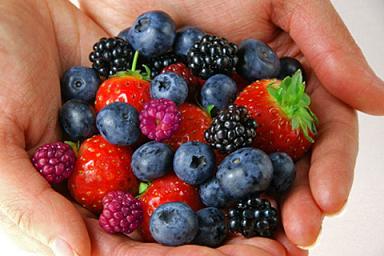 The concept of “antioxidant” has changed into a buzzword in the media. Anybody who listens to the radio, watches TV, or reads a magazine or newspaper has heard the concept. But what are antioxidants and what do they do? When I hear people speaking about antioxidants, they typically say something such as “antioxidants prevent or slow down the “aging process” or “they improve immune function”. These people are on the right track. To know more what antioxidants are, let’s first discuss the term “free radical”. A free radical is an unstable molecule that is missing an electron (charged particle). It is very reactive and potentially damaging to the tissues and organs of the body. A free radical seeks out another molecule to pair up with to gain another electron. It will steal an electron from another molecule, which in the process creates another free radical. Free radicals are a natural byproduct of energy production, what biochemists call oxidation. Hence, the concept of antioxidant means “against oxidation.”
The concept of “antioxidant” has changed into a buzzword in the media. Anybody who listens to the radio, watches TV, or reads a magazine or newspaper has heard the concept. But what are antioxidants and what do they do? When I hear people speaking about antioxidants, they typically say something such as “antioxidants prevent or slow down the “aging process” or “they improve immune function”. These people are on the right track. To know more what antioxidants are, let’s first discuss the term “free radical”. A free radical is an unstable molecule that is missing an electron (charged particle). It is very reactive and potentially damaging to the tissues and organs of the body. A free radical seeks out another molecule to pair up with to gain another electron. It will steal an electron from another molecule, which in the process creates another free radical. Free radicals are a natural byproduct of energy production, what biochemists call oxidation. Hence, the concept of antioxidant means “against oxidation.”
It is impossible to avoid free radicals. When cells “burn” oxygen as fuel to generate energy, free radicals are one of the byproducts from this life-sustaining metabolic process. Studies have revealed that free radicals are implicated generally in most diseases, including arthritis, cancer, cataracts, fatigue, heart disease, Parkinson’s disease, and even the aging process. Free radicals do have beneficial effects in the body, too, such as killing viruses. However, the levels become too high for the body to neutralize and cell damage can occur.
Our bodies produce certain antioxidants to fight against this continuous onslaught. Other antioxidants are found naturally in foods, including vitamins, minerals, and phytonutrients. Therefore, we can consume valuable antioxidants found in foods that help to quench free radicals. Also, we can avoid foods that produce free radicals, such as fast foods, which are loaded with unhealthy fats such as hydrogenated oils.
In most cases, it’s a great idea to avoid hydrogenated oils (found in margarine, vegetable cooking oils, packaged foods) and saturated fats (found in red meat and dairy products) that lead to the production of free radicals.
In addition to getting a diet that favors antioxidants, we can take antioxidant supplements to ensure adequate levels. Why all the fuss about using antioxidant supplements? Well, antioxidants are mainly found in plants. How many people are eating seven or more servings of fruits and vegetables a day? The government promotes five servings a day, but seven to ten is what one should consume for optimal health and to prevent diseases like cancer. According to studies, not many people come close to having three servings on a regular basis.